|
 March 2013
March 2013 |
|
|
|
What's New in Gifted Education | Davidson News | Legislative & Policy News | On the Web | In the News | In the
Spotlight
|
|
What's New in Gifted Education
|
| |
Intel Science Talent Search – Honoring
America's Young Scientists
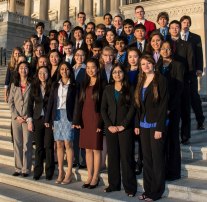 Innovation and future promise
were on full display recently as some of the brightest young
scientists in America were honored for their significant,
groundbreaking projects as the winners of the
2013 Intel Science Talent Search (STS). 2012 Davidson Fellow Laureate
Sara Volz
won the top award of $100,000 for
her her research on establishing economically feasible algae biofuels; second place winner Jonah Kallenbach was awarded $75,000 for his bioinformatics study
that predicts protein binding for drug therapy, opening doors to treatment for
diseases; and third place finisher Adam Bowman received $50,000 for successfully designing and building a compact and inexpensive, low-energy, pulsed plasma device. Innovation and future promise
were on full display recently as some of the brightest young
scientists in America were honored for their significant,
groundbreaking projects as the winners of the
2013 Intel Science Talent Search (STS). 2012 Davidson Fellow Laureate
Sara Volz
won the top award of $100,000 for
her her research on establishing economically feasible algae biofuels; second place winner Jonah Kallenbach was awarded $75,000 for his bioinformatics study
that predicts protein binding for drug therapy, opening doors to treatment for
diseases; and third place finisher Adam Bowman received $50,000 for successfully designing and building a compact and inexpensive, low-energy, pulsed plasma device.
Congratulations to 2012 Davidson Fellow
Naomi Shah and 2011 Davidson Fellow Raja Selvakumar, who were also recognized as finalists.
View the
press release
and
click here for a detailed description of each of the
finalists' projects. Sources:
New York Times,
Chemical & Engineering News
National Association for Gifted Children – New Administrator Toolbox
 With short videos, factsheets, diagrams and a program evaluation checklist, the
National Association for Gifted Children (NAGC)
recently launched a new webpage for school district leaders and administrators across the nation to help them better serve high-ability learners. Called the
Administrator Toolbox, these free resources were compiled by NAGC’s Administrator Task Force due to the increasing number of requests from administrators and to help them with briefing materials about gifted education, and tools to advocate
and implement services for gifted students. Source:
Education Week Teacher With short videos, factsheets, diagrams and a program evaluation checklist, the
National Association for Gifted Children (NAGC)
recently launched a new webpage for school district leaders and administrators across the nation to help them better serve high-ability learners. Called the
Administrator Toolbox, these free resources were compiled by NAGC’s Administrator Task Force due to the increasing number of requests from administrators and to help them with briefing materials about gifted education, and tools to advocate
and implement services for gifted students. Source:
Education Week Teacher
Ability
Grouping on the Rise
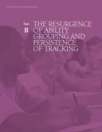 Based
on more than 20 years of research, a new
Brookings Institution report (PDF) suggests that
elementary school teachers are now comfortable placing
students into "ability groups" despite decades of
controversy. The research finds that between 1998 and 2009, the percentage of fourth grade teachers who said they created ability-based reading groups
increased from 28
percent to 71 percent. In math, between 1996 and 2011, the practice rose from 40
percent to 61 percent. The practice remained fairly constant in eighth-grade math, rising from 71
percent to 76 percent. Sources:
Brookings Institute,
USA Today,
Washington Post (op-ed).
Discuss this on the Gifted Issues Discussion Forum. Based
on more than 20 years of research, a new
Brookings Institution report (PDF) suggests that
elementary school teachers are now comfortable placing
students into "ability groups" despite decades of
controversy. The research finds that between 1998 and 2009, the percentage of fourth grade teachers who said they created ability-based reading groups
increased from 28
percent to 71 percent. In math, between 1996 and 2011, the practice rose from 40
percent to 61 percent. The practice remained fairly constant in eighth-grade math, rising from 71
percent to 76 percent. Sources:
Brookings Institute,
USA Today,
Washington Post (op-ed).
Discuss this on the Gifted Issues Discussion Forum.
|
|
|
|
Davidson News
|
| |
The Davidson Academy of Nevada
 A free public school, The Davidson Academy of Nevada
encourages and supports the abilities, strengths, and
interests of profoundly gifted middle and high school
students who score in the 99.9th percentile on IQ or college
entrance tests, such as the SAT or ACT. Prospective
students interested in receiving email updates about the
Academy can subscribe to
The Davidson Academy eNewsletter by
clicking here. A free public school, The Davidson Academy of Nevada
encourages and supports the abilities, strengths, and
interests of profoundly gifted middle and high school
students who score in the 99.9th percentile on IQ or college
entrance tests, such as the SAT or ACT. Prospective
students interested in receiving email updates about the
Academy can subscribe to
The Davidson Academy eNewsletter by
clicking here.
 2014 Davidson Fellows Scholarship 2014 Davidson Fellows Scholarship
The Davidson Institute offers $10,000,
$25,000 and $50,000
Davidson Fellows scholarships to students whose projects
have the potential to benefit society, and are at the
college graduate level. Application categories are in the
STEM fields, Humanities and Outside the Box. Applicants must
be 18 or younger as of October 10, 2014 to be eligible.
|
|
|
|
Legislative & Policy News
|
| |
CALIFORNIA – Santa Barbara school district officials recently received a suggestion from the gifted education coordinator to lower the cut-off scores for placing English-language learners into gifted programs. Under the proposed scenario, the district could decide to place 29 more students who are English-language learners into the program, increasing the overall percentage of English-language learners to 26 percent from 2 percent. Source:
Santa Barbara Independent
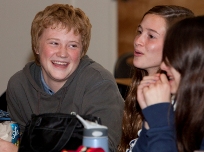 COLORADO – Denver Public Schools recently received a $3 million federal grant that will provide early college options for students in 10 city schools. The grant will be implemented over five years to expand the early college experience model, and give these students the chance to complete a semester to two years of college for free. Source:
Denver Post COLORADO – Denver Public Schools recently received a $3 million federal grant that will provide early college options for students in 10 city schools. The grant will be implemented over five years to expand the early college experience model, and give these students the chance to complete a semester to two years of college for free. Source:
Denver Post
CONNECTICUT – The New London, Windham and Bridgeport school districts will implement school-wide models of the Renzulli Gifted and Talented Academy used in Hartford. As part of a $500,000 grant from the Jack Kent Cooke Foundation, teachers for the new academies will undergo "mini-internships" conducted by the University of Connecticut. Source:
Hartford Courant
While the New London school district will receive funding for teacher training, they have eliminated a proposal to develop a program for gifted and talented students. Source:
TheDay.com
State Senator Toni Boucher is proposing the establishment of an "academically gifted advancement program" in the state that would allow gifted high school juniors to take a qualifying test and apply to waive their final year of high school in order to attend college early. Source:
New Canaan News
DELAWARE – Rep. Darryl Scott has sponsored a bill that would provide two-year, start-up grants to public schools that create programs for gifted students. If funded by the state legislature, the grants would be eligible for grades K-12. Source:
WDEL
GEORGIA – Gifted services through Rockdale County Public Schools have increased 53.4 percent over the past two years. From the 2010-11 school year to the 2012-13 school year, there was an 80 percent increase in elementary school students in the gifted program. School officials cite one reason for the growth as a system that is better at identifying qualified students. Source:
Rockdale Citizen
IDAHO – Idaho will launch a pilot program in the fall, partnering with the Khan Academy to provide free, online access to math, physics and history classes, becoming the first state to do so. The program, to be implemented in 47 schools, is funded through a $1.5 million grant from the J.A. and Kathryn Albertson Foundation. Source:
KBOI-AM
ILLINOIS
– More than 3,000 third graders were tested recently for inclusion in the Elgin-based School District U-46 gifted and talented programs. This is the first year since 2004 the district has screened all third graders rather than just a portion. Source:
Chicago Daily Herald
MISSISSIPPI
– The Lowndes County School District has dropped its gifted program for seventh and eighth graders at New Hope Middle School, replacing it with a "Pre-Advanced Placement" system. Source:
Columbus Packet
MISSOURI
– The Missouri Senate recently gave first-round approval to a new bill that would require the State Board of Education to appoint a staff person to lead and oversee educational programs for gifted and talented students. The legislation would create an advisory council on the Education of Gifted and Talented Children. Source:
UM Maneater
NEW JERSEY – The Fort Lee School District will merge a number of Advanced Placement (AP) and International Baccalaureate (IB) classes to save money, and to help students who want to take courses in both programs. After completion, the IB students will take the IB exams; both AP and IB students will be able to take AP exams. Source:
NorthJersey.com
A Gifted and Talented Educational Services Planning Team comprised of parents, students and staff members has been formed to help
the Trenton school district revive its gifted and talented program, which was a victim of budget cuts several years ago.
Numerous programs for gifted students across the state have been cut in recent
years due to tight budgets. Sources:
NJ.com,
NorthJersey.com
The Millstone Township school district is in the process of implementing a multi-tiered gifted and talented program. Source:
CentralJersey.com
NEW MEXICO
– Governor Susana Martinez is seeking $500,000 from the state legislature to replicate one school’s early college model and implement it in four or five other schools in the state. Source:
Las Cruces Sun-News
NEW YORK – New York City school officials have changed admissions tests for the city's gifted programs to help account for various factors that can affect scores, including excessive test preparation. The change has created a debate among test preparation companies, parents and educators about the effect tutoring can have on student scores, and strategies schools can use to improve the identification process for gifted education programs. Source:
New York Times
There are no plans to change admissions policies to New York City public gifted and talented programs, despite the fact they have a disproportionately low enrollment of minority students. The city has recently come under fire for the racial composition of the programs. Source:
Wall Street Journal
In response to the Department of Education’s recent proposal to downsize the P.S. 122 Gifted and Talented program, parents from the school are considering legal action. The latest in a number of plans for District 30, which covers Astoria, Long Island City, Sunnyside and Woodside, would cut the Gifted and Talented program at P.S. 122 from 11 to three classes, or about 60 seats, by 2019. Sources:
DNA Info,
Queens Chronicle
Students enrolled in the gifted program at P.S. 166 in Queens will be guaranteed gifted middle school seats within the district, an assurance parents have been fighting for the last few months. Current gifted students at P.S. 166 will automatically transfer to a new gifted middle school program the city is launching this fall at I.S. 126 in Long Island City. Sources:
DNA Info,
Queens Chronicle
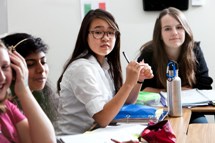 P.S. 15/The Roberto Clemente School in
Manhattan's East Village could be the site of a new gifted program this fall, provided there is strong demand for it. Source:
DNA Info P.S. 15/The Roberto Clemente School in
Manhattan's East Village could be the site of a new gifted program this fall, provided there is strong demand for it. Source:
DNA Info
NORTH CAROLINA – The Charlotte-Mecklenburg school district is offering high school juniors and seniors the opportunity to earn college credits for free before graduation. The "cooperative innovative high school" model calls for high schools to be established on college campuses. Source:
Charlotte Observer
OHIO – Ohio gifted education advocates are cautiously awaiting details of Governor John Kasich’s pledge to bolster support for gifted programs as part of his recently announced education funding plan. Kasich’s plan would give districts $50 per student for gifted programs, which
totals $85.2 million a year over the next two school years. Advocates are seeking assurance that the funding would help gifted students directly. Source:
Columbus Dispatch
The Knox County Educational Service Center is in danger of losing all of the state foundation money it currently receives for gifted services. Source:
Mount Vernon News
TEXAS – Trustees of Spring Branch Independent School District in Houston recently approved a plan to create an
academy for highly gifted students with IQ scores of 145 and above in grades K-4. Source:
Your Houston News
VIRGINIA – The Fairfax County School Board recently approved a wide-ranging study of gifted education as the school system examines the future of its gifted programs. The study will
examine how students are identified for the services, how teachers are certified to take part in the program, as well as how other districts address gifted education. Source:
Washington Post
The Fairfax County School Board also recently approved a modest expansion of the gifted education program. Four new "advanced academic centers" will be opened in the fall, three at elementary schools and one at a middle school. Source:
Washington Post
WISCONSIN – A proposal to expand the Challenge Program for academically talented third- and fourth-graders in Janesville was recently defeated. The proposed expansion would have changed the fact that space limitations have caused the district to not serve all the students who qualified for the magnet program over the last few years. Source:
Gazettextra
The Green Bay School District is planning to expand a program for academically gifted students from Langlade Elementary School to Lombardi Middle School next school year. Source: Green Bay Press Gazette
(article no longer available online)
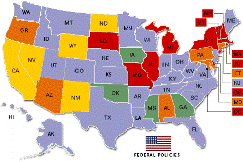
How gifted-friendly is your state? Find out
on the
Davidson Gifted Database State Policy Map.
If you know of new legislation, please contact the Communications Team.
|
|
|
|
On the Web
|
| |
Gifted Exchange Blog
Read Laura Vanderkam's take on all things gifted.
One of her recent posts is, "Should gifted classes be open to all?" Join the discussion
today!
Featured Articles and Resources
The Davidson Gifted Database at www.DavidsonGifted.org/DB is a gateway to resources for
and about gifted students.
See what's new!
Summer Camps
Beowulf Boot Camp for Louisiana high school students
will be held at Louisiana State University (LSU) in Baton Rouge this July. During Beowulf Boot Camp, students will work with a number of LSU professors
as they learn how to build and use supercomputers.
 Application season
is continuing for The Epsilon Camp,
a two-week summer residential camp located in Colorado
Springs, Colo. for exceptionally and profoundly gifted
students ages 8-11 years who love math. Epsilon Camp is an
intellectually rigorous program taught
by university mathematics professors. A unique feature of
Epsilon Camp is apartment-style housing on campus for each
family; at least one parent must attend with each child, and
additional family members are also welcome. Space is limited. A workshop designed to
help parents to build mathematical and social maturity in
their child will run parallel to the student camp. Application season
is continuing for The Epsilon Camp,
a two-week summer residential camp located in Colorado
Springs, Colo. for exceptionally and profoundly gifted
students ages 8-11 years who love math. Epsilon Camp is an
intellectually rigorous program taught
by university mathematics professors. A unique feature of
Epsilon Camp is apartment-style housing on campus for each
family; at least one parent must attend with each child, and
additional family members are also welcome. Space is limited. A workshop designed to
help parents to build mathematical and social maturity in
their child will run parallel to the student camp.
 The Summer Institute for the Gifted (SIG)
offers three-week academic summer camps for gifted and talented students
ages 4 to 18, combining academics with engaging social, cultural and
recreational opportunities. Students can choose from 22 campuses, including University of Chicago,
Harvard and
many more. The Summer Institute for the Gifted (SIG)
offers three-week academic summer camps for gifted and talented students
ages 4 to 18, combining academics with engaging social, cultural and
recreational opportunities. Students can choose from 22 campuses, including University of Chicago,
Harvard and
many more.
Articles
The article,
Deferred, Waitlisted, Rejected, and Accepted - What does it all Mean?, takes a look at the college application process.
Co-authored by noted gifted expert Jim Delisle and the Davidson Institute's own Erik Schwinger, the article, Gaining Wisdom by Giving Back: Helping Gifted Young People Help Others,
takes a look at the Davidson Institute's Ambassador Program and provides information on mentoring and giving back.
The concept of principled negotiating is covered in the article, Taking on Advocacy as a Negotiator.
 Resources Resources
Available in some states, EconChallenge is an online competition for high school students during which winning teams can eventually compete at the national level.
The Jack Kent Cooke Foundation has announced the creation of a new scholarship program for graduating high school seniors.
Jack Kent Cooke Scholars will receive up to $30,000 a year for four years to attend an undergraduate institution, as well as college planning support and advice and networking opportunities from the foundation's larger scholar community.
Jump$tart is a national coalition of organizations dedicated to improving the financial literacy of pre-kindergarten through college-age youth by providing advocacy, research, standards and educational resources.
The
National Personal Finance Challenge
is an opportunity for high school students to demonstrate their knowledge of
personal finance by competing with other students across the nation in a
three-round competition.
Suggest a Resource
Suggest an Article
|
|
|
|
In the News
|
| |
March 24 -
New York Times,
Luring Young Web Warriors Is Priority. It’s Also a Game
(Nicole Perlroth)
March 22 - New
York Times,
Girls Excel in the Classroom but Lag in Entry to 8 Elite Schools in the City
(Al Baker)
March 20 -
Washington Post,
AP good for high school, bad for college?
(Jay Mathews)
March 13 -
Slate Magazine,
Who Should Be in the Gifted Program?
(Sarah Garland)
March 13 -
Psychiatric Times,
Giftedness Should Not Be Confused With Mental Disorder
(Allen Frances)
March 13 -
Washington Post,
In a hurry to finish high school, but will parents allow it?
(Carolyn Hax)
March 11 -
The Chronicle,
Top Students, Too, Aren't Always Ready for College
(Elaine Tuttle Hansen)
March 11 -
Psychology Today,
Giftedness and Classroom Boredom: Maybe It's Not All Bad
(Christopher Taibbi)
March 8 -
Davis Enterprise,
The story of a gifted child
(Anne Ternus-Bellamy)
March 6 -
Education Week,
Project Uses Famous Profiles to Identify Gifted, Creative Students
(Sarah D. Sparks)
February 28 -
Psychology Today,
Gifted Children: Skipping Grades
(Joseph Cardillo)
February 25 -
Middletown Patch,
Monitoring Anxiety in Your Gifted Child
(Dan Peters)
February 20 -
Washington Post,
Missed challenges more worrisome than tests
(Jay Mathews)
February 15 -
Wall Street Journal,
A Genetic Code for Genius?
(Gautam Naik)
February 10 -
Education Week Teacher,
Join the Gifted Education Outreach Corps
(Tamara Fisher)
February 10 -
New York Times,
Why can some kids handle pressure while others fall apart?
(Bronson & Merryman)
February 9 -
Memphis Commercial Appeal,
Don't let programs for gifted students suffer
(Brandy DeWeese)
February 7 - New York Times,
America's Genius Glut
(Ross Eisenbrey)
Discuss these stories and
more on the
Gifted Issues Discussion Forum.
|
|
|
|
In the
Spotlight
|
| |
Gabe Salmon, 17
A Davidson Young Scholar Making a Difference
 Tell us about your project. Tell us about your project.
Elaborate schemes to raise standardized test scores make the debate about scientific education more convoluted that it should be. We tend to forget that our most essential task is to promote innovation in the wild
- to train more creative minds, to generate meaningful ideas more readily in our chosen fields. So if our goal resides in the real world, why do we turn to the classroom for inspiration? Why not move technical education closer to the object of our preparation - novel research in the laboratory or field?
The Science Circle aims to bridge this divide between classroom and reality. We hold monthly seminars connecting enthusiastic students with experienced research professionals. Initially, each Science Circle event begins in the manner of a professional research seminar. For 45-60 minutes, the presenter delivers a presentation about new research emerging in his or her discipline. Then something new happens. Students, energized by sheer possibility, begin to grapple with the concepts, asking questions and forming new connections under the guidance of the moderating presenter. Individual questions motivate fresh themes to explore and inspire cascades of inquiry. What begins as a presentation evolves into a dynamic group discussion.
Teacher expertise is among the best predictors of students’ scholastic performance. But these scientists go further than fulfilling a pedagogical role. Such discussions are inherently powerful environments for innovation. They reveal the majesty of scientific discovery that only emerges from proximity to hard problems. In the process, we participate in the cadence of creativity. Recent work by many scientists and authors suggests that creative insight materializes in the intersections of collective input: good ideas are grounded in collisions of perspective. The Science Circle contributes an environment where ideas coalesce into new insights.
Ultimately, the Science Circle seeks to fulfill the promise of circularity. We hope to be an important step in the cycle of inspiration and progress. Among the hundreds of students in the program, many find that discovery is tangible, accessible. (Frequently, students connect with scientists for research opportunities, bringing their education closer to scientific relevance.) May the inspired themselves become inspiring.
How has the Young Scholars Ambassador program helped you to reach your goals and achieve your accomplishments?
The Young
Scholars Ambassadors Program (YSAP) represents a wonderful
platform to foster original social change. The web seminars
provide valuable context about the nature and diversity of
philanthropy. Our advisors, especially Erik Schwinger, are imaginative and enthusiastic mentors, always encouraging us to enlarge the possible.
In particular, the Ambassador program will continue to help
the Science Circle become a sustainable community venture
for local audiences and beyond.
The YSAP program itself operates in a noble tradition of philanthropy. We are all grateful for the opportunity to learn from such dedicated individuals.
What are some of your short-term and long-term plans?
I aim to conduct research in my own laboratory someday. In particular, I’m interested in exploring the nature of (bio)molecular complexity. I’m excited by the biological opportunities afforded by modern computational ability.
In the shorter term, I hope to use college and graduate school to better understand what it means to generate insight in science.
Please describe your academic setting and some positive experiences with mentors.
I study many of my classes independently. This promotes deeper exploration of course material, and I am grateful for my academic circumstances.
I’m astonished at the generosity of scientists and professionals, busy dreamers willing to share guidance and knowledge at the expense of their time. In particular, a passionate scientist and his graduate students at my local university have been incredible mentors, scientifically and personally.
And then there’s you - you are the students and teachers and individuals who uphold inquiry as a human imperative. Who could be better mentors than that?
|
|
|
|
Closing Thought
|
| |
"The Intel Science Talent Search is an opportunity to reshape the dialogue around our
nation’s youth. We believe
it’s crucial to U.S. innovation to bring greater attention to math and science achievement,
encourage more youth to embrace these fields, and demonstrate the impact these
subjects have
on our country’s future success."
~ Wendy Hawkins, Executive Director, Intel Foundation
|
|
|
|
If you have information to include in future eNews-Updates, please email our Communications Team.
If you have been forwarded this eNews-Update, and wish to receive future editions,
sign-up here. |
|
Davidson Institute for Talent Development
Supporting our nation's brightest young minds.
9665 Gateway Drive, Suite B, Reno, Nevada 89521
Phone: 775-852-3483 Fax: 775-852-2184
Email: administrator@davidsongifted.org Web: www.DavidsonGifted.org
Request a Brochure online.
To
subscribe, visit the
Davidson Institute's
eNews-Update archive page on the Davidson Gifted Database.



"Like"
the Davidson Institute on
Facebook
and follow us on
Twitter.
The Davidson Institute also has a number of
YouTube videos!
|
 March 2013
March 2013  Innovation and future promise
were on full display recently as some of the brightest young
scientists in America were honored for their significant,
groundbreaking projects as the winners of the
Innovation and future promise
were on full display recently as some of the brightest young
scientists in America were honored for their significant,
groundbreaking projects as the winners of the
 With short videos, factsheets, diagrams and a program evaluation checklist, the
With short videos, factsheets, diagrams and a program evaluation checklist, the
 Based
on more than 20 years of research, a new
Based
on more than 20 years of research, a new  A free public school,
A free public school, 
 P.S. 15/The Roberto Clemente School in
Manhattan's East Village could be the site of a new gifted program this fall, provided there is strong demand for it. Source:
P.S. 15/The Roberto Clemente School in
Manhattan's East Village could be the site of a new gifted program this fall, provided there is strong demand for it. Source:

 Application season
is continuing for
Application season
is continuing for  The
The  Resources
Resources Tell us about your project.
Tell us about your project.